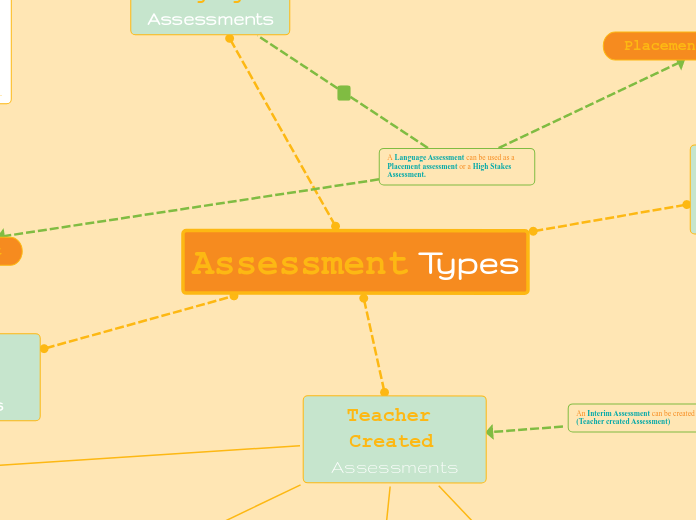Assessment Types
Teacher Created Assessments
Pre-Assessments
DEFINITION
Administered before students begin a lesson, unit, course, or academic program
Students are not necessarily expected to know all of the material
Pre-assessment establishes a baseline for measuring learning progress over the duration of a program, course, or instructional period
Pre-assessment can determine general academic readiness for a course, program, grade level, or new academic program into which a student may be transferring
EXAMPLES
Quizzes, Informational surveys, Questionnaires, Inventories.Journals

Formative Assessment
DEFINITION
In-process evaluations of student learning that are administered multiple times during a unit, course, or program.
They give educators in-process feedback about what students are learning or not learning so that instructional approaches, teaching materials, and academic support can be modified accordingly.
Formative assessments are usually not scored or graded, can be informal in nature, and they may take a variety of forms
EXAMPLES
Quizzes, Informational surveys, Questionnaires, Inventories.Journals
Summative Assesment
DEFINITION
Used to evaluate student learning at the conclusion of a specific instructional period— the end of a unit, course, semester, program, or school year.
Used to determine whether students have learned what they were expected to learn during the defined instructional period.
Subtopic
Midterm Exam, Final Exam, AP Exams,

Portfolio Assessment
DEFINITION
Are collections of academic work that are compiled by students and assessed by teachers in consistent ways.
Portfolio-based assessments are often used to evaluate a “body of knowledge”—i.e., the acquisition of diverse knowledge and skills over a period of time.
Portfolio materials can be collected in physical or digital formats, and they are often evaluated to determine whether students have met required learning standards.
EXAMPLES
Resume, Art Portfolios, Portfolio Websites

Performance Assessment
DEFINITION
Typically require students to complete a complex task.
Educators will often use collaboratively developed common assessments, scoring guides, rubrics, and other methods to evaluate whether the work produced by students shows that they have learned what they were expected to learn.
Performance assessments may also be called “authentic assessments,” since they are considered by some educators to be more accurate and meaningful evaluations of learning achievement than traditional tests.
EXAMPLES
Presentations, debates, roll plays, peer-teaching. Songs in L2, Video/recordings in L2.

An Interim Assessment can be created and used by a teacher (Teacher created Assessment)
Government Required Assessments
High Stakes Assessment
DEFINITION
Used as accountability to federal, state, or local government agencies to assess the effectiveness of schools/teachers
Important decisions about students, teachers, schools, or districts are based on the scores students achieve on a high-stakes test
punishments (sanctions, penalties, reduced funding, negative publicity, not being promoted to the next grade, not being allowed to graduate)
accolades (awards, public celebration, positive publicity, bonuses, grade promotion, diplomas) result from those scores.
EXAMPLES
SAT, ACT, GRE (European Exams that determine your future) UPCAT, Bar Exam...

School Required Assessments
Common Assessment
DEFINITION
Used in a school or district to ensure that all teachers are evaluating student performance in a more consistent, reliable, and effective manner.
Common assessments are used to encourage greater consistency in teaching and assessment among teachers who are responsible for teaching the same content, grade level, department, or content area.
They allow educators to compare performance results across multiple classrooms, courses, schools, and/or learning experiences.
Common assessments share the same format and are administered in consistent ways.
EXAMPLE
In Language Programs there are tests that are uniform for all classes.

Screening Assessment
DEFINITION
Used to determine whether students may need specialized assistance or services
Screening assessments may take a wide variety of forms in educational settings, and they may be developmental, physical, cognitive, or academic.
EXAMPLES
IEP, Finger printing (screening out the criminals).
DRUG TESTS, INTERVIEWS , COLOR BLIND, HEARING TEST, EYE EXAM.

Placement Assessment
DEFINITION
Used to “place” students into a course, course level, or academic program.
Placement assessments are administered before a course/program begins.
The basic intent is to match students with appropriate learning experiences that address their distinct learning needs.
Examples?
EXAMPLE
Reading Tests, Tryouts (A,B,C Teams) WIDA screener, HSPT (HighSchool Placement Test.)

Interim Assessment
DEFINITION
Used to evaluate where students are in their learning progress and determine whether they are on track to performing well on future assessments
Interim assessments are usually administered periodically during a course or school year (for example, every six or eight weeks) and separately from the process of instructing students (i.e., unlike formative assessments, which are integrated into the instructional process).
EXAMPLES
standardized tests: PSAT, or end-of-course exams.

Language Assessments
Prociciency-Based Assessment
DEFINITION
Based on students demonstrating that they have learned the knowledge and skills they are expected to learn as they progress through a language.
To ensure that students are acquiring the knowledge and skills that are deemed to be essential to interacting in an additional language/culture
EXAMPLES
WIDA - Model , OPI, TOEFL, TOIC, IELTS, JLPT

